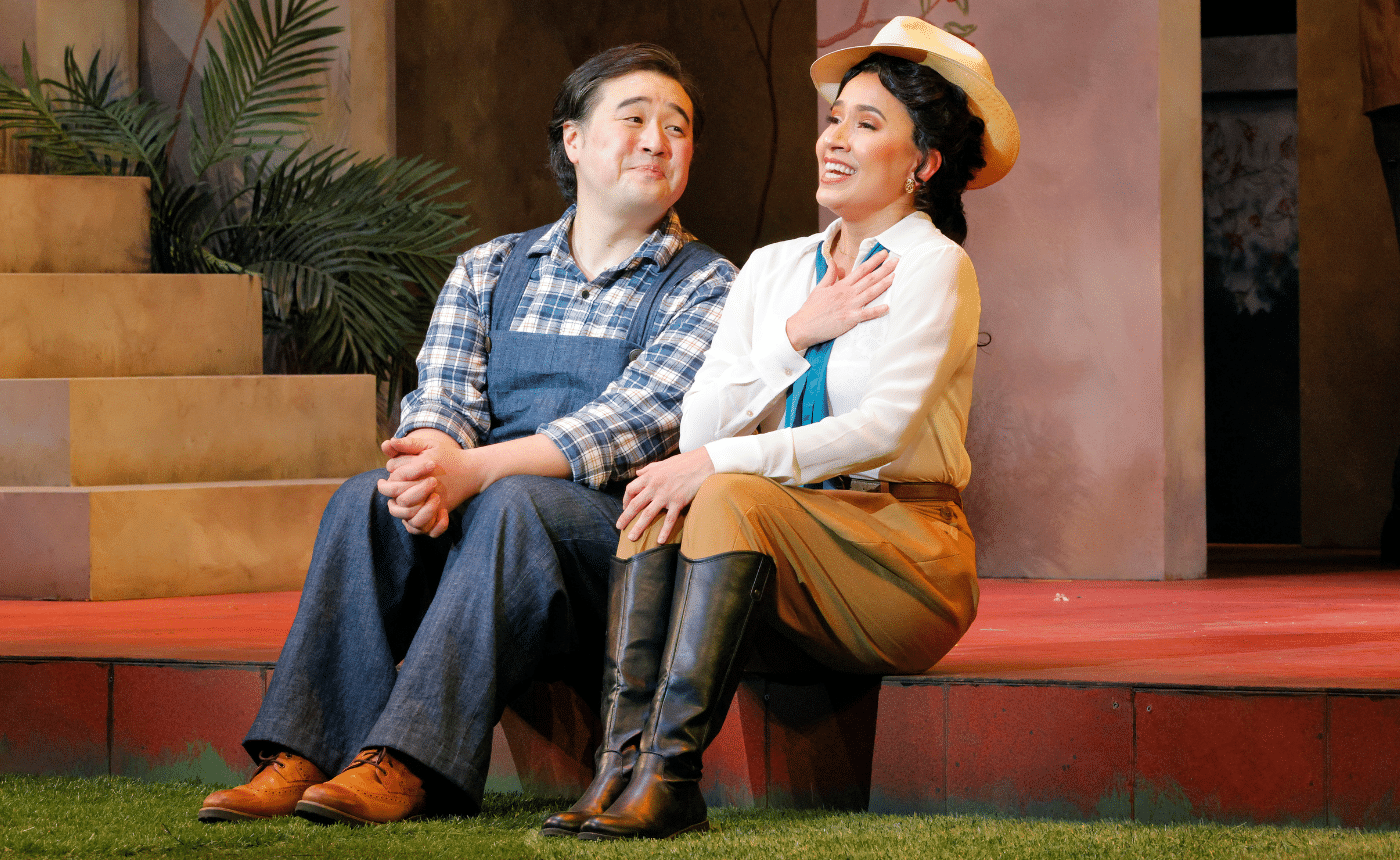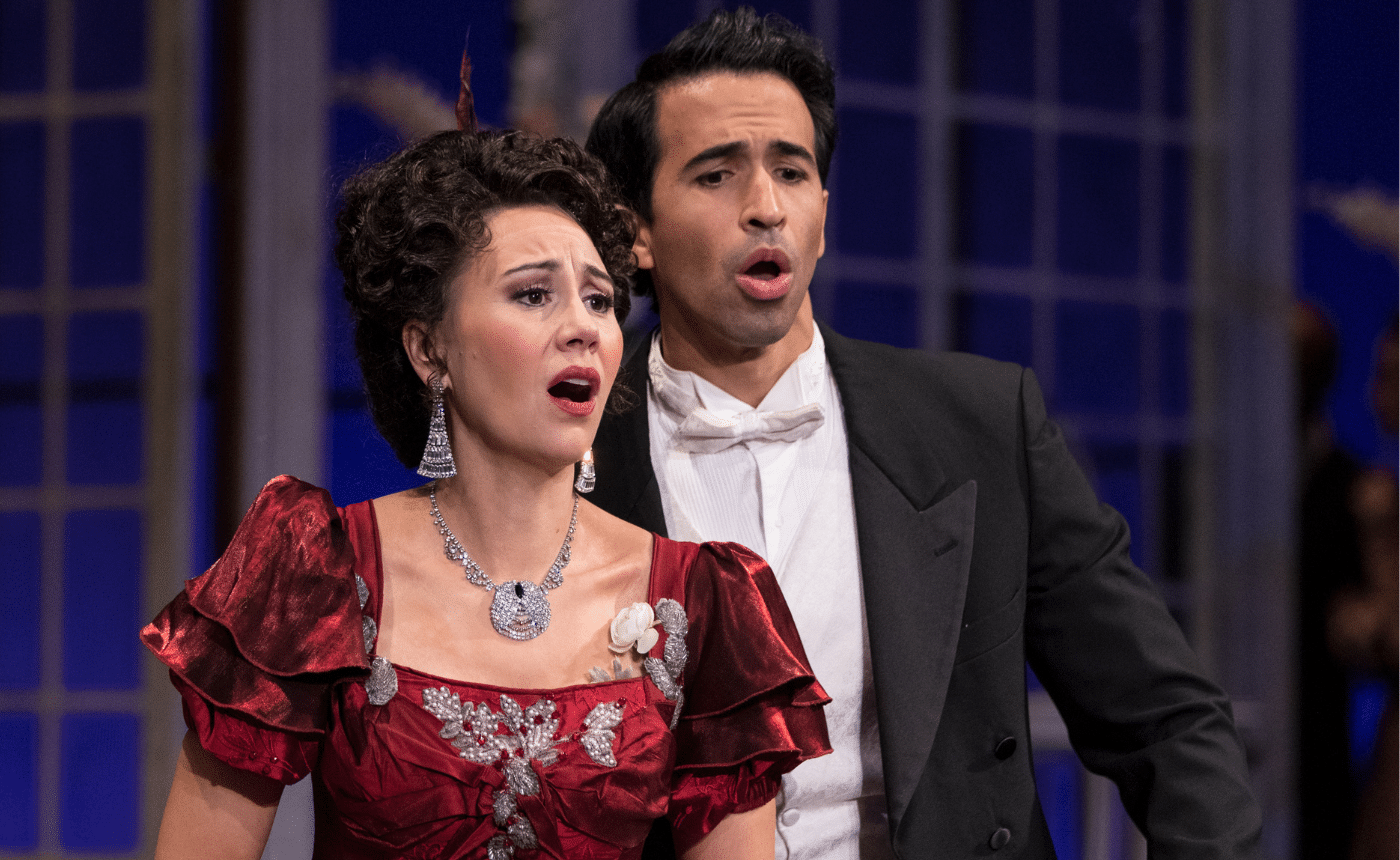Carmen: The Musical Story – Act 2
Act 2
An “Entr’acte” – in actuality a Prelude, though it can’t be called that, since, by definition, a “pre-lude” can only be played at the start of the evening – introduces Act 2. Bassoons give us a melody we will hear later on. Then strings and winds comment in a variety of keys before finally settling into the major key. It’s possible that the triplet figure in the final bars should remind us of the similar figure in Carmen’s Sequidilla.
We are now in Carmen’s favorite week-end hang-out (if we can believe her Seguidilla): Lillas Pastia’s dive. She is there together with Zuniga, Moralès, various soldiers, Frasquita, Mercédès and various gypsies. Violas, cellos and harp vamp, almost lazily, in E minor. Flutes introduce a theme which travels through various keys before coming home to the tonic. According to the original libretto, dinner is over, though the table has not yet been cleared; a couple of gypsies are playing guitars in a corner; two are dancing; all are smoking (Nasty Habit!); Zuniga is talking quietly to Carmen, but she is ignoring him. Suddenly she gets up and starts to sing a gypsy song in three verses, each one faster than the previous one; Frasquita and Mercédès join her in the “Tra la la” refrains. The concluding dance gets wilder and more passionate. “Carmen falls breathless on a bench at the last orchestral chord.”
Pastia himself appears, seeming embarrassed. He explains that it’s late and he really should close for the night so as not to run foul of the law, which doesn’t look on him kindly at the moment, though he’s not sure why. Zuniga scoffs at that, saying it’s common knowledge that all the local smugglers meet here. But if they have to leave, they will and he asks the girls to go with them to the theatre. Pastia signs to the girls to refuse, which they do. Zuniga tries to persuade Carmen to join them, but she adamantly refuses. He wonders, perhaps, that she doesn’t like him because a month ago he sent her to prison. “I don’t remember going to prison.” No, damn it, you didn’t. But the brigadier who let you escape was demoted and jailed, but he’s now free. Good, says Carmen. All is abbreviated in recitative, and Pastia is reduced to a non-speaking role whose words about closing time are sung by Frasquita.
The dialogue, or recitative, is interrupted by an off-stage male chorus in praise of Escamillo, the Torero. A torch-lit procession is accompanying the man who, after recent successes in Grenada, promises to become the most famous of all bull-fighters. Moralès suggests inviting him in for a toast, which Zuniga does, to Pastia’s discomfort.
No sooner on-stage, Escamillo launches into his “Toréador Song,” a swaggering, alpha-male celebration of his prowess in the bull-ring, and, assuming it’s well sung (it’s very difficult), a celebration of the singer’s own prowess. The first verse is a brilliant evocation of the excitement of the crowd at a bull fight. The refrain, in the major, reminds the Toréador that love awaits him. Of course everyone on-stage joins in a repeat of his refrain or tune, or even, reflecting its popular pronunciation, “chune” – yes, I know y’all know it, but restrain yourselves! The second verse is more detailed, noting that a horse is gored, dragging down its rider; the banderillos pierce the bull with more darts. Finally he, and specifically Escamillo, enters the ring to plunge his sword exactly into the spot in the back of the bull’s neck that will kill it instantly: a highly skilled, not to say dangerous, art. In the coda Frasquita and Mercédès repeat the words “L’amour” to a swooning descent of a 7th, but it is Carmen’s drop to a flattened octave that grabs Escamillo’s attention.
Despite Pastia’s efforts to get rid of the crowd, Escamillo makes his way to Carmen. “Tell me your name so I can speak it when I kill a bull.” Carmen, or Carmencita. “If I fell in love with you, and wanted to be loved by you, what would you say?” You can love me, but don’t think that, right now, I could love you. “I’ll wait, and hope.” I can’t stop you waiting, and it’s always nice to hope.
Another attempt by Moralès to get the girls to join them is rebuffed, but Zuniga tells Carmen that he’ll be back in an hour, after the official call to return to barracks. Not a good idea, says Carmen. Everyone leaves with Escamillo’s procession, accompanied by the full orchestra playing his “chune.”
Now we learn why Pastia was so anxious to get rid of everyone: Dancaïre and Remondado have returned and need to talk about “gypsy business.” Dancaïre is obviously the boss of the operation – all business – while Remondado always wants to add colorful details about the place and the people they’ll be dealing with: much of which is eliminated in recitative. They just got back from Gibraltar (pretty place; lots of handsome Englishmen there; a bit standoffish, but distinguished, according to Remendado). Dancaïre has arranged a smuggling deal; “our people” are ready, but we need you three girls tonight.
In a brilliant Quintet (Bizet, by the way, again changes the text to suit his musical idea) the men explain why the girls are essential to the success of the plan: only they are experts in deception and, it’s implied, seduction. Carmen, while fully in favor of the idea, says she will join them tomorrow. In sentimentally exaggerated thirds the guys wonder why she could abandon them now. When she tells them she’s in love the guys are even more mocking: you’ve never let your love-affairs interfere with your work. This time is different, she says. But she agrees, when the main theme returns, that women are essential to this kind of work. What can one say about this Quintet but “WOW!” Operatic ensembles tend to be dramatically static, with each character voicing his/her reaction to what has just happened. Here, though, we have a fluid dramatic situation which initially pits two men against three women, then one woman against two men, then against two women, though all are in final agreement that (return of the melody of the men’s statement) women are essential for this kind of operation. Is there any other operatic ensemble (except maybe the endings of Acts 2 and 3 of Verdi’s Falstaff, which appeared eighteen years later) which contains such fun, such a sense of that French joie de vivre, not to mention such amazing orchestral writing? No. It was unique then, and it has stayed unique. Genius. Pure and simple.

Photo: Kent Miles 2010
Dancaïre, as boss of the operation, is challenged by Carmen’s refusal to join them; Remendado acts as a peace-maker. Who, asks Frasquita, since she’s never seen Carmen so infatuated, is the guy? Telling them it’s a soldier who once helped her, they know he’s the one she sent a loaf of bread containing a gold coin and a file, neither of which he used. With that evidence, Dancaïre is dismissive, accusing José of cowardice; so why would he show up tonight? Since this is opera, show up he does, singing, off-stage, and unaccompanied, the tune we heard from the bassoons in the Entr’acte. Paul Lhérie, the original José, was not only off-stage but also off-key: “incapable of singing accurately in the wings in the second act,” according to Bizet. After the opening night he showed up in César Franck’s organ class at the Conservatoire to ask if any student would be willing to play the harmonium backstage: “A few peep-peeps on the harmonium will keep him on pitch…” The young Vincent d’Indy, who went on to compose various now mostly-unknown works, volunteered.
Frasquita and Mercédès note how handsome he is; Dancaïre suggests that Carmen should persuade him to join their gang, but Carmen is skeptical: he’s too naïve. Why then love him, he wonders; she responds, he’s cute-looking and I like him. Which prompts a snarky comment from Remendado, which prompts Dancaïre to chase him off-stage and prompts the girls to follow them to calm them down.
José, after a second verse of his martial ditty, enters, and again the dialogue is more interesting. “Finally you’re here” Carmen says. “I was released about two hours ago.” What about the file and the gold coin I sent you? I’m still an honorable soldier who believes desertion would be criminal, and he hands her back the coin. She calls for Pastia and orders “everything you’ve got.” She asks José if he regrets going to prison for her sake; No, he replies: “because I love you, I adore you.” And, taken directly from Mérimée, she tells him: “I pay my debts; it’s our gypsy law: I pay my debts.” The food arrives and Carmen grabs the candy. She tells him that Zuniga and various officers left a short while ago; they made her dance for them and when she had finished the Lieutenant said he adored here. You’re not jealous are you? Certainly! You’re such a canary (his uniform in yellow); don’t get all ruffled: I’ll dance for you, just for you. She can’t find her castanets and tenderly accuses him of having stolen them, but, breaking a plate in two – these will do.
What follows is the longest section of continuous music we’ve heard all evening. The score divides it into a “Duet” and “Finale”; they are separated by a dramatic pause, but there is no more dialogue in this act.
Playfully formal (and playfulness is an essential part of her character) Carmen announces she will dance in his honor and that he should note the accompaniment. She tells him where to sit and begins. In the first edition of the piano-vocal score, Bizet adds a footnote: “The part of the castanets engraved in small type is to be performed either in the orchestra…or on stage by the artist who plays Carmen. In that case the rhythm could be modified to suit the singer.” The original libretto has a slightly different text which specifies the dance: the Romalis, defined in the ENO Guide as “a very old and sexy gypsy dance.”
Wordlessly, Carmen sings as she dances, while pizzicato strings keep her in tune. Soon 2 trumpets are heard in the distance. José stops the dance – Why? – I think I hear trumpets calling us back to barracks. And the trumpets repeat their call, nearer now. How wonderful: dancing without an orchestra is so melancholy, so let’s enjoy the music that comes to us from the sky!” And she resumes her dance. No, says José, you don’t understand: I must return to barracks.
Carmen is stunned. A fortissimo scale rips up from the violins. How stupid could I have been! I did everything (and the winds have a hard time keeping up with her melody) to entertain “monsieur” (and surely giving him that title is meant as an insult!): I sang; I danced; I even, God forgive me, thought that I loved him! She imitates the call of the bugle and, she says, he leaves, he’s gone; then go, boy: take your helmet, your sword, your ammunition pouch, and back to your barracks. Sadly, accompanied by clarinet arpeggios, José says she is wrong to make fun of him: never, until now, has a woman so deeply troubled his heart. Carmen is having none of his protestation (though check out the “Writing” section, for Bizet cut her response) and she returns to her trumpet-mimicking: it’s the call to return to barracks; I’ll be late; he goes crazy, and that’s the man I love? You don’t believe me? Listen! No! You will listen to me! He grabs her arm and violently throws her into a chair (remember he has admitted to killing someone before our story begins!)
As José takes the flower from his tunic the English Horn emerges from that huge fortissimo D minor chord and, reminds us of the “Fate” theme, though it’s more lyrical this time. Listen to how Bizet takes us through wondrous harmonic shifts until we are arrive, a mere half-step down, in Db, and there José begins his famous “Flower Song.” Its glorious opening phrase was salvaged from six-year-old sketches for Grisélidis, a three-act opéra-comique with a libretto by Victorien Sardou (most famous now for having written the play which Puccini turned into Tosca.) Throughout his month-long sentence, José tells Carmen, he kept in his tunic the flower she threw at him which, despite being withered, retained its sweet scent. (Again, Bizet changed the librettists’ words to clarify and simplify their meaning.) At night I would inhale it and see only you. I cursed you and wondered why fate had put you in my path. But then I felt I was blaspheming because I had only one desire and hope: to see you again, because just one look from you would make me yours. And, so delicately with a slowing-up and a softening scale rising to a high Bb (rarely done), he admits he would be her slave, because, unaccompanied at first, he vows he loves her; it takes a few beats for the winds, surprised into a foreign key, to figure their way, magically, back into the home key. It’s interesting that in the recitative version (but not in the dialogue one) this is the first time José confesses his love for Carmen. Before the dance he admitted he adores her, but that was in a quasi-flirtatious recitative. And, by the way, whoever turned the dialogue into recitative text extended José’s sentence to two months.
Of course there’ll be applause after this wonderful aria, but Bizet didn’t seem to want it: “No, you don’t love me” says Carmen as soon as the final note is played. And I feel sorry for José, who has just so passionately opened himself emotionally (remember his conservative – repressed? – upbringing), is now rebuffed by that “Non!” Timpani begins a tum-ti-tum rhythm (think, oh ye who love Beethoven’s symphonies, of the rhythm of the main theme of the first movement of his 7th Symphony; or of that of the second movement of his 9th); this rhythm spreads, insidiously, through the entire orchestra. If, and she sings insinuatingly in 2/4 against the orchestra’s 6/8, you loved me, you’d come with me. (José’s distressed pleas become weaker.) I’d ride with you on your horse over the mountains, where you wouldn’t have to answer to anyone, especially to a trumpet that calls for lovers to leave each other. The open air becomes a universe, your will is your law, and above all, Freedom. José is tempted, but with a huge discord from the orchestra, decides that to desert his flag would be a disgrace he could not suffer. Carmen is incensed. Sadly, but nobly in Eb he bids her farewell forever. The orchestra thinks the scene should end in C minor, but a discord interrupts when someone knocks on the door. Zuniga has returned, as promised; and, as Carmen warned, it’s not a good idea.
Since no-one answers his knocking, Zuniga breaks down the door and comes in. Seeing José there
he first mocks Carmen (exaggerated “romantic” kind of vocal phrase) for her poor choice in selecting the demoted José over himself. Get out of here, he orders; José refuses and threatens his superior officer. To hell with jealousy says Carmen and calls for help. Not only do Remendado and Dancaïre appear, with Frasquita and Mercédès, (we knew they were in the next room), but also appear the entire chorus, now (non-smoking) gypsies.
In music that would not seem out of place in an Offenbach operetta, Carmen, echoed by Rem. and Dan. (who disarm Zuniga) tells him charmingly yet sarcastically that he’s arrived at a most inopportune moment and so must be held for about an hour or so. Somehow, though Rem. and Dan. sing essentially the same music as Carmen, they sound much more dangerous. Faced with the crowd, Zuniga has no choice but to consent, but he promises vengeance. Spoils of war, says Dancaïre. Zuniga is led off.
Are you with us now, asks Carmen of José. Do I have a choice? Not very gallant. But soon you will see how great is the freedom we have. The act ends with a huge hymn to liberty, though we might question what on earth is the chorus doing there – why are so many people involved in the smuggling operation – since the earlier Quintet had stressed the importance of just a few women. Drama be damned: Bizet needed a big choral ending which would set up the opening of the next act. And there’s no denying the power of that hymn to freedom!
©Paul Dorgan




